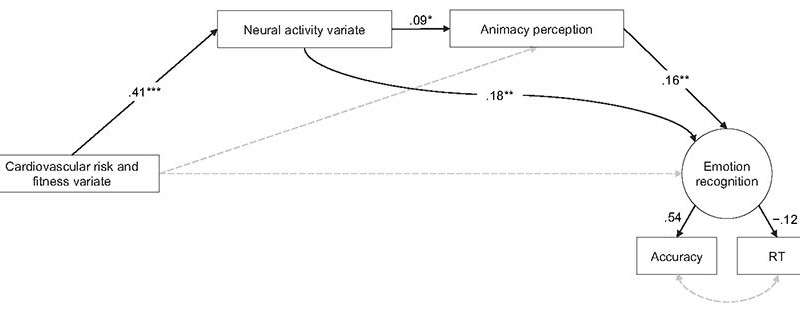Cardiovascular risk factors and low physical fitness associated with decline in social cognitive functions

A research collaboration has revealed that cardiovascular risk factors (obesity and high blood pressure) and low physical fitness are associated with decreased social brain network-related neural activity, which causes social cognitive functions to decline.
This suggests that having a healthy lifestyle is not only beneficial for disease prevention but also for maintaining and improving sociability. It is hoped that future research will lead to the development of proposals for efficient intervention methods through investigations into the effectiveness of interventions that target cardiovascular risk factors and fitness (e.g., exercise/balanced diet programs) on social cognition.
This collaborative study was conducted by research group that included Assistant Professor Ishihara Toru (Graduate School of Human Development and Environment, Kobe University) and Professor Matsuda Tetsuya (Tamagawa University Brain Science Institute).
These results were published in the American College of Sports Medicine’s journal Medicine and Science in Sports & Exercise on June 6, 2022.
Obesity has tripled in the last 40 years, and due to this and other contributing factors, the consequent increase in the number of people at risk for cardiovascular disease has been declared a cause for public health concern (WHO, 2021). In addition, there is also data indicating that people’s cardiorespiratory endurance has been decreasing over the last 40 years (Lamoureux et al., 2019, Sports Med). Previous research has shown that decreased cognition (memory, awareness etc.) is associated with cardiovascular risk factors and low fitness levels (Yang et al, 2018, Neurosci Biobehav Rev; Colcombe & Kramer, 2003, Psychol Sci).
However, such research had yet to focus on social cognition, which forms the basis for social interactions. Social cognition is believed to play an important role in our social lives and psychological health. In the current circumstances, where the number of people at risk of cardiovascular disease and those with low fitness levels are increasing, finding out whether or not these people are also at risk of decreased social cognition is a pressing issue. With this in mind, the research group used functional magnetic resonance imaging data to investigate the relationship between cardiovascular risk factors, fitness and social cognition.
This study analyzed the data of 1,027 people registered in the Human Connectome Project’s database (U.S.). For the cardiovascular risk factors, the researchers used Body Mass Index (BMI), which is calculated from each person’s height and weight, and systolic and diastolic blood pressure data. As indicators of fitness, the researchers used respiratory endurance, gait speed, hand dexterity, and grip strength (calculated using the NIH Toolbox). To assess social cognitive function, they used animacy perception accuracy, and the reaction times and percentage of correct answers for the emotion recognition task. Brain activity during social cognition (i.e., during animacy perception) was measured using functional magnetic resonance imaging.
The research group then used the collected data to investigate the relationship between brain activity during social cognition and cardiovascular risk factors/physical fitness. Afterwards, they investigated how brain activity during social cognition mediates the relationship between cardiovascular risk factors/fitness and social cognitive functions.
The higher the BMI/blood pressure and the lower the fitness levels of the subject, the lower their neural activity levels were in the social brain network (temporo-parietal junction, temporal lobe, inferior frontal gyrus and posterior cingulate cortex) during social cognition (Figure 1). Among these associations, BMI, endurance and hand dexterity in particular were found to be strongly connected to this decrease in neural activity.
Furthermore, they found that cardiovascular risk factors/fitness levels, via neural activity during social cognition, were related to the accuracy of animacy perception and emotion recognition task results (Figure 2). These results indicate that high BMI/blood pressure and low fitness levels are associated with social cognitive decline by way of decreased social brain network-related neural activity.
Source: Read Full Article

